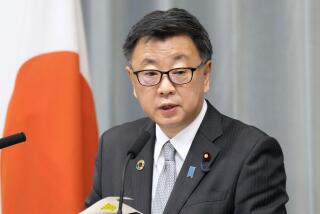Planned Visits Mark Warmer China-Japan Ties : Asia: Communist Party chief Jiang will go to Tokyo, and Emperor Akihito might travel to Beijing this year.
BEIJING — Japan and China moved Saturday toward increasingly friendly ties, announcing that Communist Party General Secretary Jiang Zemin will visit Tokyo by the end of June and that Japanese Emperor Akihito might visit Beijing this fall.
The announcement, made during a visit by Japanese Foreign Minister Michio Watanabe, brings Sino-Japanese relations to a level of warmth unseen between China and any of the major industrialized democracies since the brutal 1989 army crackdown on pro-democracy demonstrations in Beijing.
Chinese Premier Li Peng, in remarks to Watanabe reported by the official New China News Agency, predicted that Jiang’s visit to Tokyo will be “of great significance.” Li added that if Emperor Akihito and Empress Michiko visit China they “would be warmly welcomed.”
The two sides also announced that National People’s Congress Chairman Wan Li will visit Tokyo this year.
Japan has taken the lead in trying to end economic and political sanctions imposed on China by Western nations after the 1989 massacre. Tokyo argues that the capitalist democracies can best promote reform and development here through developing closer economic and political ties, rather than by isolating Beijing in punishment for human rights violations.
While Europe and Japan have basically normalized ties with Beijing, Sino-U.S. relations remain tense because of political repression here and trade issues.
Japanese officials, including then-Prime Minister Toshiki Kaifu, who visited here in August, have attempted to put some pressure on Beijing concerning human rights. But they have couched their requests primarily in terms of Beijing’s need to repair its image.
This pattern was repeated Saturday. During his talks with Chinese Foreign Minister Qian Qichen, Watanabe stressed that “the human rights question is not only a Japanese, but also an international concern, and to respond in a positive way would contribute to the improvement of the status of China in international society.” Watanabe’s remarks were given to reporters by Seiji Morimoto, a Japanese Foreign Ministry spokesman.
“Our concept for the Sino-Japan relationship is that . . . we discuss not only bilateral or regional questions but global issues, in order to make a contribution to international society,” Morimoto said. “We do hope that this year will ‘bridge,’ so to say, our new relationship (toward) the 21st Century.”
The proposed autumn visit by the emperor and empress would mark the 20th anniversary of the establishment of diplomatic ties between Tokyo and Beijing, Morimoto said, adding that the Japanese government is “seriously considering the possibility of a visit.”
Watanabe and Qian also discussed arms control, the situation in the former Soviet Union, the Korean Peninsula, Cambodia, Sino-U.S. relations and global environmental issues, according to statements by the two sides.
The New China News Agency reported that Qian and Watanabe agreed that both countries should promote efforts at reconciliation between Communist North Korea and capitalist South Korea. Qian also expressed support for the creation of a nuclear-free zone on the Korean Peninsula, the agency reported.
Both sides agreed that North Korea should sign a nuclear safeguards agreement providing for international inspection of its nuclear facilities to ensure that they are not for military purposes, Morimoto said.
Communist Party chief Jiang, in his meeting with Watanabe, said that “it is easier for China and Japan, with similar cultural traditions, to understand each other,” the official Chinese news agency reported. The remark appeared to be, at least in part, an expression of appreciation for Japan’s willingness to expand ties with China despite the 1989 crackdown and continued political repression here.
A Japanese Foreign Ministry official, speaking on condition that he not be further identified, expressed somewhat similar ideas. He noted that China has achieved considerable economic success and suggested that “there might be stages in development of the human rights question or the degree of democratization.”
“Japan is one of the ancient countries, and China is our important neighbor,” he said. “It might be understandable that Japan takes a slightly different position from the United States or other Western countries.”
This Japanese official added that “the present stagnation” of U.S.-China ties “is not wholesome for the international community.”
“We do hope that they will be improved by the efforts of both sides,” he said. “We understand both sides. We understand what the United States is saying, and we understand, at least theoretically, what the Chinese side says. So we are trying to explain to each side what the other is thinking.”
More to Read
Sign up for Essential California
The most important California stories and recommendations in your inbox every morning.
You may occasionally receive promotional content from the Los Angeles Times.










